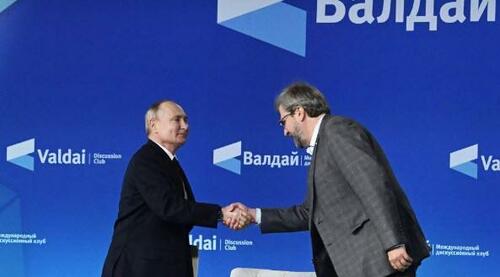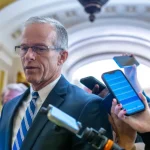
There was a whiff of Thomas Mann’s 'The Magic Mountain' at the 20th Valdai annual meeting this week at a hotel over the gorgeous heights of the Krasnaya Polyana. north-west of the picturesque resort Sochi.
But instead of a deep dive into the lure and degeneracy of ideas in an introverted community in the Swiss Alps on the eve of the First World War, we immersed ourselves in powerful new ideas expressed by a community of Global Majority intellectuals on the possible eve of a psycho neocon-intended WWIII.
And then, of course, President Putin intervened, striking the plenary session like lightning.
This is an unofficial Top Ten of his address, before the Q&A which was characteristically engaging:
“I even suggested joining NATO for Russia. But no, NATO does not need such a country (…) Apparently, the problem is geopolitical interests and an arrogant attitude towards others.”
“We never started the so-called war in Ukraine. We are trying to end it.”
“In the international system, lawlessness reigns supreme.”
“This is not a territorial war. The issue is much broader and more fundamental: it is about the principles on which a new world order will be built.”
“The history of the West is a chronicle of endless expansion, and a huge financial pyramid.”
“A certain part of the West always needs an enemy. To preserve the internal control of their system.”
“Perhaps [the West] should check its hubris.”
“That era [of Western domination] is long gone. It’s never coming back.”
“Russia is a distinct civilization-state”.
“Our understanding of civilization is quite different. First, there are many civilizations. And none of them is better or worse than the other. They are equal, as expressions of the aspirations of their cultures, their traditions, their peoples. For each of us it is different.”
On The Road to “Asynchronous Multipolarity”
The theme of Valdai 2023 was, most appropriately, 'Fair Multipolarity'. The key axes of discussion were presented in this provocative, detailed report. It’s as if the report had prepared the stage for Putin’s address and his carefully crafted answers to the questions from the plenary.
The concept of multipolarity in the Russian space was first articulated by the late, great Yevgeny Primakov in the mid-Nineties. Now, the road to multipolarity is based on Foreign Minister Sergey Lavrov’s concept of “strategic patience”.
In a crisscrossed cornucopia of nation-states, larger blocs, security blocs and ideological historic blocs, we’re now deep into mega-alignments - even as the political West cultivates its universalist ambitions. The Eurasian “non-bloc” is in fact a mega-alignment, as much as the revitalized Non-Aligned Movement (NAM), which finds its expression in the G77 (actually formed by 134 nations).
The ideal path to follow might be horizontalism - in a Deleuze-Guattari sense - where we would have 200 equal nation-states. Of course the collective West won’t allow it. Andrey Shushentov, Dean of the School of International Relations at MGIMO University, proposes the notion of “asynchronous multipolarity”. Radhika Desai of Manitoba University proposes “pluripolarity” - borrowing from Hugo Chavez.
The risk, as expressed by Turkish political scientist Ilter Turan, is that by trying to build a replica of the present system via, for instance, BRICS 11, we may be racing towards a parallel system that simply cannot organize itself as the leader of a new order. So, a clearly possible outcome is a bipolar system – considering the impossible convergence of common values.
At the same time, a South-east Asian perspective, expressed by the President of the Diplomatic Academy of Vietnam, Pham Lan Dung, points to what is really relevant for middle and small countries: everything should proceed on the basis of South-South friendships.
The BRICS Bank: It’s Complicated
In one of the key panels on BRICS as a prototype of a new international architecture, the star of the show was Brazilian economist Paulo Nogueira Batista Jr, who drew on his vast former experience at the IMF and as Vice-President of the NDB – the BRICS bank – for a realist presentation.
The key problem of the NDB is how to maintain unity while navigating power politics and reaching the upcoming stages of de-dollarization.
Batista outlined how a new international financial architecture may imply a future common currency. He stressed the success of implementing two practical experiments: a BRICS monetary fund (called the Contingent Reserve Agreement, CRA) and a multilateral development bank, the NDB.
Progress though “has been slow”. The monetary fund “has been frozen by the five Central Banks”, and must be expanded. Links with the IMF “must be severed”, but that incurs “fierce resistance” by the five Central Banks of BRICS members (and soon there will be 11).
Turning the NDB around will be a Sisyphean task. Disbursement of loans as well as project implementation have been “slow”. The US dollar “is the unit of account for the bank” - which in itself is counter-productive. The NDB is far from being a global bank: only three countries so far have joined. Current NDB President Dilma Rousseff has only two years to turn it around.
Batista remarked how the common currency idea first came from Russia, and was instantly embraced by Lula when he was Brazil’s President in the 2000s. The R5 concept - the currencies of all current five BRICS members start with a “R” - may endure; but now that will have to expand to R11.
The first substantial step ahead, after revamping the NDB, should be a currency from an issuing bank backed by bonds guaranteed by member countries, freely convertible, with currency swaps denominated in R5.
A healthy prospect is that Russia will appoint the next bank President starting in 2025. So the way forward substantially depends on Russia and Brazil, Batista emphasized. At the BRICS 11 summit in Kazan in south-west Russia next year, “a key decision should be made”. And during the Brazilian BRICS presidency in 2025, “the first practical steps should be announced”.
Looking For a New Universality
Almost all panels at Valdai focused on how to develop an alternative system, but the two main themes were inevitably the lack of democracy in current international institutions and the weaponization of the US dollar. Batista correctly observed how the US itself is the main enemy of the US dollar when using it as a weapon.
At the Q&A, Putin addressed the key issue of economic corridors. He noted how BRI and the Eurasia Economic Union (EAEU) might have different interests: “Not true. They are harmonious and complement each other”. This is reflected in how they are geared to “ensure new logistic routes and industrial chains”, and all that “complemented by the real productive sector”.
Going forward, there’s a pressing need to coin a new terminology for this emerging new “universality” - even as nations continue to behave most often by following national interests.
What’s clear is that the collective West’s "universality” is not valid anymore. A remarkable panel on 'Russian Civilization Through the Centuries' showed how the notion of “universality” actually entered Western civilization through St Paul - after his Damascus moment - whereas the Indian notion of equilibrium inbuilt in the Upanishads would be way more appropriate.
Still, we are now in hot debate over the notion of the “civilization-state”, as configured mostly by India and China, Russia and Iran.
Pierre de Gaulle, grandson of the iconic General, expanded on the French notion of universality, embodied in the much-quoted slogan “liberté, egalité, fraternité” – not exactly upheld by Macronism. He made a point to stress he was the “sole representative of France” at Valdai (only a handful of European academics came to Sochi, and no diplomats).
De Gaulle reminded everyone how Saint Simon was a Russophile and how Voltaire corresponded with Catherine the Great. He alluded to the deep Franco-Russian cultural ties; a “shared community of interests”; and “the bond of Christianity”.
In contrast, crucially, “the US never accepted that Russia could develop under a different model”. And now that is illustrated by “how little today's intellectual elites in the West know about Eurasia.”
De Gaulle emphasized the “tragic mistake is to see Russia through Western eyes”. He invoked Dostoevsky as he lamented the current “destruction of family values” and “existential void” inbuilt in the process of manufacturing consent. He pledged to “fight for independence”, just like his grandfather, under the seal of “faith, family and honor”, and stressed “we must rethink Europe”, inviting “war profiteers to come to Russia”.
Top of The Hill: a Cathedral or a Fortress?
Beyond Valdai, and especially throughout the crucial year of 2024 - while Russia holds the presidency of BRICS - there will be much further discussion about “poles” of ancient civilizations. A broad coalition of states that support multipolarity actually do not support the “civilization” concept; instead, they support the notion of people sovereignty.
It was up to Dayan Jayatilleka, former Sri Lankan plenipotentiary ambassador to Russia, to come up with a brilliant formulation.
He showed how Vietnam faced a proxy war against the hegemon successfully – “using 5,000 years of Vietnamese civilization”. That was “an internationalist phenomenon”. Ho Chi Minh took his ideas from Lenin – while enjoying full support from students in the US and Europe.
Russia might therefore learn from the Vietnamese experience how to conquer young hearts and minds across the West for its quest towards multipolarity.
It was clear to the overwhelming majority of analysts at Valdai that the concept of Russian civilization is an “existential challenge” to the collective West. Especially because it includes, historically, the radical universality of the Soviet Union. Now is time for Russian thinkers to work hard on refining the internationalist aspect.
Alexander Prokhanov came up with another startling formulation. He compared the Russian dream with a cathedral on the top of a hill, whereas the Anglo-Saxon dream is a fortress on the top of the hill, engaged in constant surveillance. And if you misbehave, you “will receive some Tomahawks”.
The conclusion: “We will always be in conflict with the West”. So what? The future, as I discussed off the record with Grandmaster Sergey Karaganov, one of the founders of Valdai, is in the East.
And it was Karaganov who arguably posed the most challenging question to Putin. He stressed how nuclear deterrence does not work anymore. So should we lower the nuclear threshold?”
Putin replied, “I am well aware of your position. Let me remind you the Russian military doctrine has two reasons for the possible use of nuclear weapons. The first is if nuclear weapons are used against us – as retaliation. The response is absolutely unacceptable for any potential aggressor. Because from the moment a missile launch is detected, no matter where it comes from - anywhere in the world's oceans or from any territory - in a retaliatory strike, so many, so many hundreds of our missiles appear in the air that no enemy will have a chance of survival, and in several directions at once.”
The second reason is “a threat to the existence of the Russian state even if only conventional weapons are used.”
And then came the clincher – actually a veiled message to the characters whose dream is “victory” via a first strike: “Do we need to change that? Why? I see no point. There’s no situation when something can threaten the existence of the Russian state. No sane person would consider the use of nuclear weapons against Russia.”
There was a whiff of Thomas Mann’s ‘The Magic Mountain’ at the 20th Valdai annual meeting this week at a hotel over the gorgeous heights of the Krasnaya Polyana. north-west of the picturesque resort Sochi.
But instead of a deep dive into the lure and degeneracy of ideas in an introverted community in the Swiss Alps on the eve of the First World War, we immersed ourselves in powerful new ideas expressed by a community of Global Majority intellectuals on the possible eve of a psycho neocon-intended WWIII.
And then, of course, President Putin intervened, striking the plenary session like lightning.
This is an unofficial Top Ten of his address, before the Q&A which was characteristically engaging:
“I even suggested joining NATO for Russia. But no, NATO does not need such a country (…) Apparently, the problem is geopolitical interests and an arrogant attitude towards others.”
“We never started the so-called war in Ukraine. We are trying to end it.”
“In the international system, lawlessness reigns supreme.”
“This is not a territorial war. The issue is much broader and more fundamental: it is about the principles on which a new world order will be built.”
“The history of the West is a chronicle of endless expansion, and a huge financial pyramid.”
“A certain part of the West always needs an enemy. To preserve the internal control of their system.”
“Perhaps [the West] should check its hubris.”
“That era [of Western domination] is long gone. It’s never coming back.”
“Russia is a distinct civilization-state”.
“Our understanding of civilization is quite different. First, there are many civilizations. And none of them is better or worse than the other. They are equal, as expressions of the aspirations of their cultures, their traditions, their peoples. For each of us it is different.”
On The Road to “Asynchronous Multipolarity”
The theme of Valdai 2023 was, most appropriately, ‘Fair Multipolarity’. The key axes of discussion were presented in this provocative, detailed report. It’s as if the report had prepared the stage for Putin’s address and his carefully crafted answers to the questions from the plenary.
The concept of multipolarity in the Russian space was first articulated by the late, great Yevgeny Primakov in the mid-Nineties. Now, the road to multipolarity is based on Foreign Minister Sergey Lavrov’s concept of “strategic patience”.
In a crisscrossed cornucopia of nation-states, larger blocs, security blocs and ideological historic blocs, we’re now deep into mega-alignments – even as the political West cultivates its universalist ambitions. The Eurasian “non-bloc” is in fact a mega-alignment, as much as the revitalized Non-Aligned Movement (NAM), which finds its expression in the G77 (actually formed by 134 nations).
The ideal path to follow might be horizontalism – in a Deleuze-Guattari sense – where we would have 200 equal nation-states. Of course the collective West won’t allow it. Andrey Shushentov, Dean of the School of International Relations at MGIMO University, proposes the notion of “asynchronous multipolarity”. Radhika Desai of Manitoba University proposes “pluripolarity” – borrowing from Hugo Chavez.
The risk, as expressed by Turkish political scientist Ilter Turan, is that by trying to build a replica of the present system via, for instance, BRICS 11, we may be racing towards a parallel system that simply cannot organize itself as the leader of a new order. So, a clearly possible outcome is a bipolar system – considering the impossible convergence of common values.
At the same time, a South-east Asian perspective, expressed by the President of the Diplomatic Academy of Vietnam, Pham Lan Dung, points to what is really relevant for middle and small countries: everything should proceed on the basis of South-South friendships.
The BRICS Bank: It’s Complicated
In one of the key panels on BRICS as a prototype of a new international architecture, the star of the show was Brazilian economist Paulo Nogueira Batista Jr, who drew on his vast former experience at the IMF and as Vice-President of the NDB – the BRICS bank – for a realist presentation.
The key problem of the NDB is how to maintain unity while navigating power politics and reaching the upcoming stages of de-dollarization.
Batista outlined how a new international financial architecture may imply a future common currency. He stressed the success of implementing two practical experiments: a BRICS monetary fund (called the Contingent Reserve Agreement, CRA) and a multilateral development bank, the NDB.
Progress though “has been slow”. The monetary fund “has been frozen by the five Central Banks”, and must be expanded. Links with the IMF “must be severed”, but that incurs “fierce resistance” by the five Central Banks of BRICS members (and soon there will be 11).
Turning the NDB around will be a Sisyphean task. Disbursement of loans as well as project implementation have been “slow”. The US dollar “is the unit of account for the bank” – which in itself is counter-productive. The NDB is far from being a global bank: only three countries so far have joined. Current NDB President Dilma Rousseff has only two years to turn it around.
Batista remarked how the common currency idea first came from Russia, and was instantly embraced by Lula when he was Brazil’s President in the 2000s. The R5 concept – the currencies of all current five BRICS members start with a “R” – may endure; but now that will have to expand to R11.
The first substantial step ahead, after revamping the NDB, should be a currency from an issuing bank backed by bonds guaranteed by member countries, freely convertible, with currency swaps denominated in R5.
A healthy prospect is that Russia will appoint the next bank President starting in 2025. So the way forward substantially depends on Russia and Brazil, Batista emphasized. At the BRICS 11 summit in Kazan in south-west Russia next year, “a key decision should be made”. And during the Brazilian BRICS presidency in 2025, “the first practical steps should be announced”.
Looking For a New Universality
Almost all panels at Valdai focused on how to develop an alternative system, but the two main themes were inevitably the lack of democracy in current international institutions and the weaponization of the US dollar. Batista correctly observed how the US itself is the main enemy of the US dollar when using it as a weapon.
At the Q&A, Putin addressed the key issue of economic corridors. He noted how BRI and the Eurasia Economic Union (EAEU) might have different interests: “Not true. They are harmonious and complement each other”. This is reflected in how they are geared to “ensure new logistic routes and industrial chains”, and all that “complemented by the real productive sector”.
Going forward, there’s a pressing need to coin a new terminology for this emerging new “universality” – even as nations continue to behave most often by following national interests.
What’s clear is that the collective West’s “universality” is not valid anymore. A remarkable panel on ‘Russian Civilization Through the Centuries’ showed how the notion of “universality” actually entered Western civilization through St Paul – after his Damascus moment – whereas the Indian notion of equilibrium inbuilt in the Upanishads would be way more appropriate.
Still, we are now in hot debate over the notion of the “civilization-state”, as configured mostly by India and China, Russia and Iran.
Pierre de Gaulle, grandson of the iconic General, expanded on the French notion of universality, embodied in the much-quoted slogan “liberté, egalité, fraternité” – not exactly upheld by Macronism. He made a point to stress he was the “sole representative of France” at Valdai (only a handful of European academics came to Sochi, and no diplomats).
De Gaulle reminded everyone how Saint Simon was a Russophile and how Voltaire corresponded with Catherine the Great. He alluded to the deep Franco-Russian cultural ties; a “shared community of interests”; and “the bond of Christianity”.
In contrast, crucially, “the US never accepted that Russia could develop under a different model”. And now that is illustrated by “how little today’s intellectual elites in the West know about Eurasia.”
De Gaulle emphasized the “tragic mistake is to see Russia through Western eyes”. He invoked Dostoevsky as he lamented the current “destruction of family values” and “existential void” inbuilt in the process of manufacturing consent. He pledged to “fight for independence”, just like his grandfather, under the seal of “faith, family and honor”, and stressed “we must rethink Europe”, inviting “war profiteers to come to Russia”.
Top of The Hill: a Cathedral or a Fortress?
Beyond Valdai, and especially throughout the crucial year of 2024 – while Russia holds the presidency of BRICS – there will be much further discussion about “poles” of ancient civilizations. A broad coalition of states that support multipolarity actually do not support the “civilization” concept; instead, they support the notion of people sovereignty.
It was up to Dayan Jayatilleka, former Sri Lankan plenipotentiary ambassador to Russia, to come up with a brilliant formulation.
He showed how Vietnam faced a proxy war against the hegemon successfully – “using 5,000 years of Vietnamese civilization”. That was “an internationalist phenomenon”. Ho Chi Minh took his ideas from Lenin – while enjoying full support from students in the US and Europe.
Russia might therefore learn from the Vietnamese experience how to conquer young hearts and minds across the West for its quest towards multipolarity.
It was clear to the overwhelming majority of analysts at Valdai that the concept of Russian civilization is an “existential challenge” to the collective West. Especially because it includes, historically, the radical universality of the Soviet Union. Now is time for Russian thinkers to work hard on refining the internationalist aspect.
Alexander Prokhanov came up with another startling formulation. He compared the Russian dream with a cathedral on the top of a hill, whereas the Anglo-Saxon dream is a fortress on the top of the hill, engaged in constant surveillance. And if you misbehave, you “will receive some Tomahawks”.
The conclusion: “We will always be in conflict with the West”. So what? The future, as I discussed off the record with Grandmaster Sergey Karaganov, one of the founders of Valdai, is in the East.
And it was Karaganov who arguably posed the most challenging question to Putin. He stressed how nuclear deterrence does not work anymore. So should we lower the nuclear threshold?”
Putin replied, “I am well aware of your position. Let me remind you the Russian military doctrine has two reasons for the possible use of nuclear weapons. The first is if nuclear weapons are used against us – as retaliation. The response is absolutely unacceptable for any potential aggressor. Because from the moment a missile launch is detected, no matter where it comes from – anywhere in the world’s oceans or from any territory – in a retaliatory strike, so many, so many hundreds of our missiles appear in the air that no enemy will have a chance of survival, and in several directions at once.”
The second reason is “a threat to the existence of the Russian state even if only conventional weapons are used.”
And then came the clincher – actually a veiled message to the characters whose dream is “victory” via a first strike: “Do we need to change that? Why? I see no point. There’s no situation when something can threaten the existence of the Russian state. No sane person would consider the use of nuclear weapons against Russia.”
Loading…





